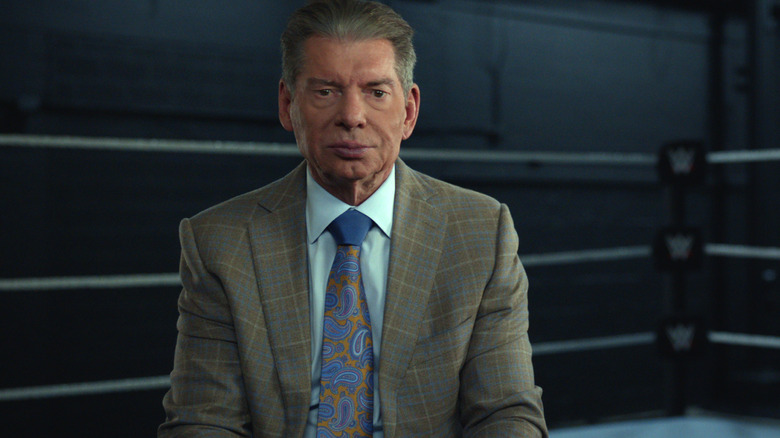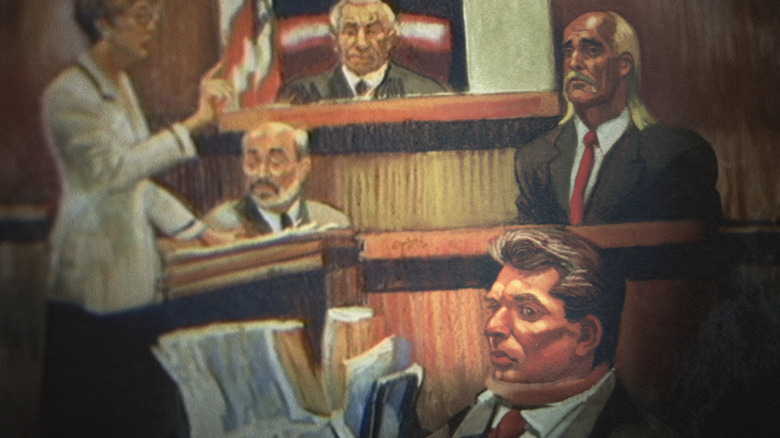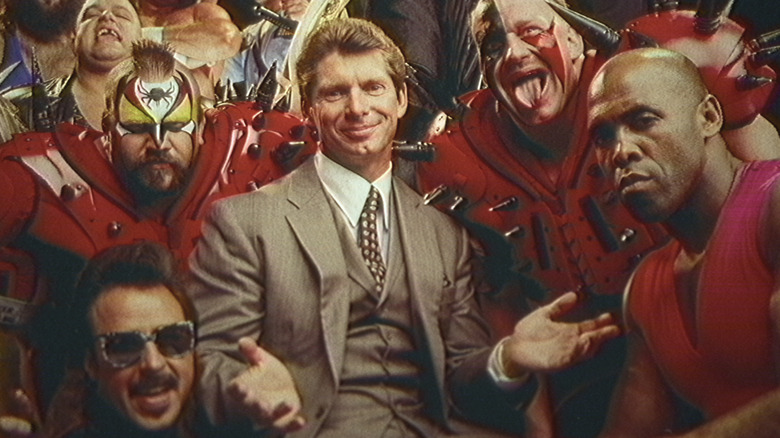One Major Question Remains After Netflix's Mr. McMahon
As the final episode of Netflix' "Mr. McMahon" draws to a close, the interviewers can be heard asking various WWE personalities what they think Vince McMahon's legacy will be. The Undertaker, Trish Stratus, Booker T, and John Cena either refuse to answer the question or try and fail. Atlas says McMahon's legacy will be that he was the greatest promoter of all time, despite his failings, but wrestling journalists/historians Dave Meltzer and David Shoemaker seem less certain, saying nothing good or admirable that McMahon may have done can be separated from the horrible things he's done or is alleged to have done.
Then we hear McMahon speak the series' final words as images of himself throughout his life flash across the screen, from childhood photos to clips of his in-ring escapades.
"Sometimes the lines of reality, of fact and fiction are very blurred in our business," McMahon says. "Sometimes what happens is, performers start believing in themselves. They start believing in their own character. The individual loses all sense of who they really are personally. They become the character.
"I'm wondering myself now, which is the character and which is me? I guess maybe it's a blend. I would suggest that one is exaggerated a little bit, but ... I'm not so sure which one."
It's safe to say that many wrestling fans expected "Mr. McMahon" to end on some kind of triumphant note, papering over his dark side with breathless admiration for his creative and business accomplishments. That is not the case. The end of "Mr. McMahon" demands its viewers ask one question above all others: Was the on-screen character of Mr. McMahon a character at all, or was that just who Vince was? Or did Vince, as the final voiceover suggests, eventually transform into Mr. McMahon?
Mr. McMahon doesn't pull any punches
By this point, over the course of six episodes, we've witnessed McMahon's rise to power, wealth, and fame, but we've also witnessed the long list of horrors associated with that rise. "Mr. McMahon" goes into detail on Tom Cole and the ring boy scandal, the steroid scandal, and the alleged rape of Rita Chatterton, and doesn't seem interested in arguing that these were isolated incidents. At one point, Tony Atlas casually mentions that Pat Patterson once grabbed his genitals; when the interviewer asks why Atlas didn't go to Vince about the incident, Atlas breaks into hysterical laughter.
The Montreal Screwjob is covered — with a significantly smaller segment given to the so-called Original Screwjob involving Wendi Richter and The Fabulous Moolah — as is the death of Owen Hart. We've witnessed WWE programming dissolve into obscenity and depravery, with McMahon himself playing the role of the company's most sadistic (and sexually predatory) villain. There's an entire episode about McMahon's family members and how they were presented on television, including a moment where the modern-day McMahon confirms he once pitched a storyline that would have seen him impregnate his own daughter.
And of course, there's the last episode, which goes into more detail than anyone could have suspected about the Janel Grant lawsuit, Ashley Massaro, and all the other revelations of the past two years. A project that many fans (rightfully) dismissed as hagiographic fluff when it was first announced by WWE in 2020 somehow transformed into what Conrad Thompson called "a double-shovel burial," and by the time we've reached the end, we've seen largely everything we need to see.
There's a face in the mirror, but it isn't me
Midway through the series, Vince says he has nothing in common with Mr. McMahon — a statement that's immediately followed by a parade of WWE notables explaining that Vince and Mr. McMahon are essentially the same person. But if others can recognize on some level that McMahon was in fact the monster he portrayed, McMahon himself remains largely unrepentant, defending his actions throughout the series even in its most current interview. He doesn't see himself as a villain.
McMahon once admitted that in his famous feud with "Stone Cold" Steve Austin, he identified more with Austin's character than his own. The Mr. McMahon character wasn't intended as a self-portrait, but it did serve to deflect criticism. It allowed Vince's audience to channel their anger at him and the things he had done into his fictional persona — who, vitally, often got his comeuppance. McMahon was never afraid to be the butt of his own jokes, writing himself into the most embarrassing scenes, participating in matches that saw him take move after move and bleed with the best of them. In an era where kayfabe died a brutal and unmistakable death (thanks in no small part to McMahon himself) he still managed to blur those lines of reality, to make his audience cheer for his onscreen downfall while his company collected the money they paid for the privilege.
But as McMahon also says during the series, perception is reality, and it seems clear that the lines didn't just blur for the audience. Maybe Mr. McMahon isn't the facade; maybe he never was. Maybe the facade is the quiet man sitting for an interview, delusionally insisting that the Attitude Era was family-friendly. Despite his lamentation that "nobody really knows me," maybe Vince McMahon has spent the last three decades showing the entire world exactly who he is.


